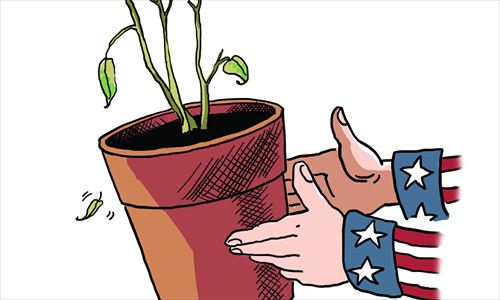Arab quest for spring will be tumultuous and long-lasting struggle

The mass outbreak of turbulence in 2010 in the Middle East was once viewed as a hopeful democratic revolutionary movement by the West. Therefore, they used "Arab Spring" to describe this movement and actively supported and guided it. However, two years have passed and this "revolution" has experienced seasonal changes: from spring to summer, and from fall to winter.
Today, pessimistic sentiments are not only common in the Middle East, but also affect the West because of the continuously worsening regional situation. Currently, people are concerned about how long this "Arab Winter" will last and when the "spring" of the Arab people will really come.
Judging by the state of the Middle East, we cannot be optimistic about the situation. The post-revolution countries have been in a tight spot of follow-up development. After the revolutions, the countries face arduous task of reconstruction. The people who took to the streets to overthrow the old dictatorships are still toiling to get by. Their dissatisfaction with the new regimes is accumulating. And arguments are raging about the future between religions and secular groups and between different religious sects. Egypt may face the risk of a second revolution for this reason.
Syria which is experiencing a revolution, and its surrounding countries, are not much better off. Due to external interference, the Syrian revolution no longer reflects people's initial demands, but has become a civil war. Some people even call Syria a proxy war that reflects disputes among religious sects and the competing of geopolitical interests.
Affected by Syria, the situation in Lebanon and Jordan is on the edge of turbulence. The destabilizing political factors in countries such as Morocco and Algeria are also increasing. Perhaps more worryingly, various radical forces, extremist groups and terrorists are trying to make use of the turbulence to obtain benefits and expand their strength in volatile region.
In fact, the Arab revolution was just a part of the social transformation that regional countries are experiencing. It was internally generated, but people in those countries were unprepared to stand on the historical stage. This movement does not have clear constructive goals, authoritative organizations or leaders. Therefore, after the success of the revolution, many people lost their direction.
Besides, with the growing external intervention and meddling, this movement is increasingly affected by the competing of geopolitical interests, disputes between religious sects and game among powers. The regional situation is becoming more and more complex.
The "Arab Spring" has promoted political change and social transformation in the Middle East, including the reconstruction of national institutions and political systems. However, the transformation of the social culture is more important because it can determine success or failure of future political transformation.
Looking at countries which have already undergone political transformation such as Tunisia, Egypt and Libya, religious, social and cultural factors have already exerted their influences on the political transformation. These countries are trying to establish modern national institutions and a democratic system, the basic characteristics of which are that authoritarian regimes will be replaced by political pluralism. Such institutions and systems should be supported by a mature and dynamic civil society.
However, the historical reality of the Middle East is that clans and the governments have long been the most powerful forces while social forces have never fully developed. Centuries of religious culture and social customs are deeply rooted in the Middle East and have penetrated into politics, economy and society.
It is not easy to change the traditional ideas and social ethics with just a democratic charter or a multiparty election. Hence the full transformation of Arab countries will be a long-term, complex and even sometimes disordered process.
The author is director of the Institute for Foreign Policy Studies of the Shanghai Institutes for International Studies and vice president of China Association of Middle East Studies. opinion@globaltimes.com.cn